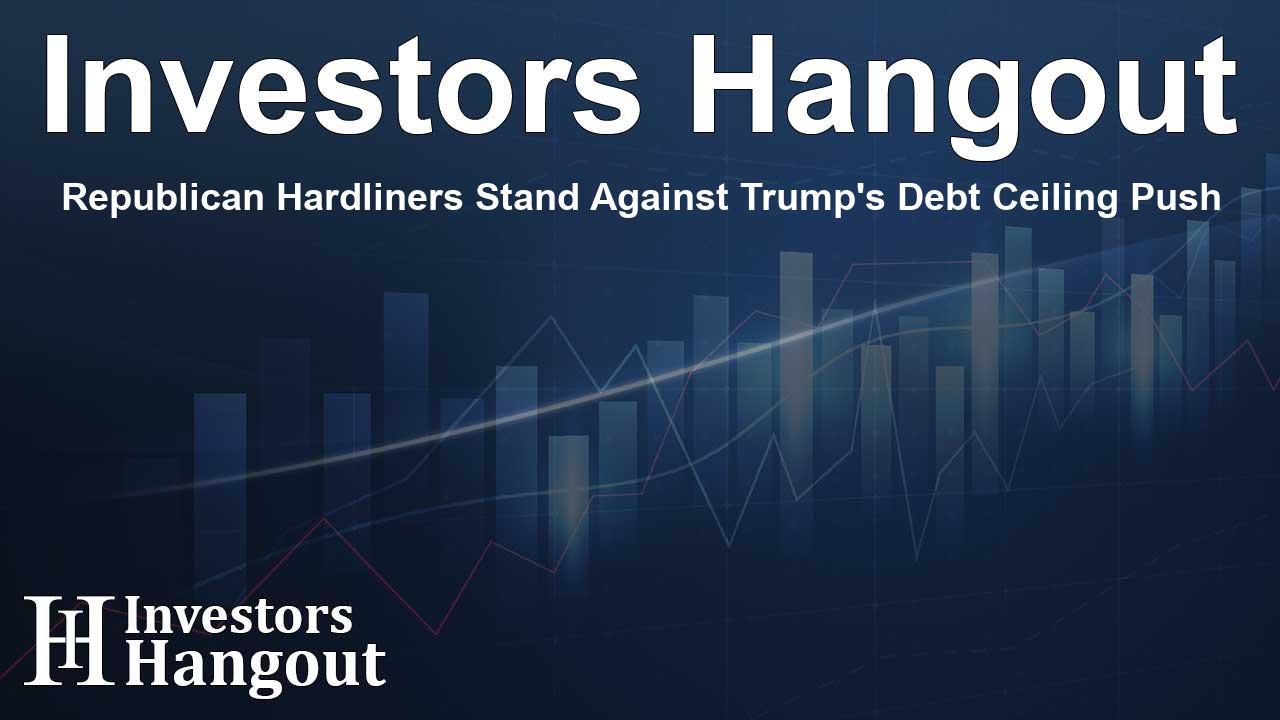Republican Hardliners Stand Against Trump's Debt Ceiling Push

Republican Hardliners Stand Against Trump's Debt Ceiling Push
In the political landscape, hardline Republicans, typically strong allies of President-elect Donald Trump, are showing resistance to his recent demand regarding the U.S. debt ceiling. This pushback underscores a growing concern among these party members about government spending.
House Republicans Challenge Trump's Authority
A significant moment in this ongoing challenge occurred when 38 members of the House of Representatives voted against a debt ceiling bill pushed by Trump. This outcome highlights a notable limit to Trump's influence, especially as the nation approaches a pivotal date for his inauguration.
This decision marked the first time Congress faced a vote on a Trump-backed initiative since the election. While a few of Trump's Cabinet nominees faced criticism from Republicans, the withdrawal of other candidates seemed to stem from their own decisions rather than party pressure.
Concerns Over Fiscal Responsibility
Trump's proposition to suspend borrowing limits comes at a time when the national debt has surpassed a staggering $36 trillion. This proposal clashes with long-standing Republican principles concerning fiscal prudence. Representative Nancy Mace, one of the dissenting votes, articulated the danger of allowing Congress to increase debt unchecked, reinforcing the party's concerns about reckless spending.
As political discussions around fiscal policies heat up, Trump is also advocating for further tax cuts in his upcoming term, which experts estimate could potentially increase the nation's debt by another $4 trillion over the next decade. In an effort to cut government expenditure, he has enlisted notable figures like Elon Musk, the CEO of Tesla, and entrepreneur Vivek Ramaswamy.
Impact on Republican Dynamics
The Republicans opposing the recent bill hail from traditionally conservative districts across states like Florida, Texas, and Pennsylvania. Their votes reflect a broader apprehension within the party about diverging from fiscal responsibility, prompting concerns about potential consequences in future elections.
Trump has publicly announced his intent to support Republican challengers in the 2026 midterm elections who align more closely with his views, urging a push against those he labels as 'Republican obstructionists.'
Ongoing Political Brinkmanship
Following the setback, Trump's demands have shifted, with calls for a five-year suspension of the debt limit instead of the earlier proposal. Hardline Republicans, like Representative Chip Roy, have made it clear that they will not endorse lifting the debt ceiling without a definitive plan for reducing spending.
Historically, Congress has enforced borrowing limits since 1939 to control government debt. However, this policy has often led to political standoffs, with the risk of default looming over the nation and the global economic system.
Challenges for House Leadership
The failure to pass the debt ceiling bill creates additional strain on Republican House Speaker Mike Johnson, who often needs to rely on bipartisan support to advance essential legislation. As the new Congress prepares to convene, the Republican majority is expected to be reduced, which may complicate future legislative initiatives.
Johnson's leadership will be under scrutiny as a temporary government shutdown becomes an ever-increasing possibility, following dissent from within his party regarding fiscal policies.
Frequently Asked Questions
What actions are hardline Republicans taking against Trump's proposals?
Hardline Republicans are opposing Trump's attempts to raise the debt ceiling, viewing it as a threat to fiscal responsibility.
How many House Republicans voted against Trump's debt ceiling bill?
Thirty-eight House Republicans voted against the debt ceiling bill requested by Trump, showing dissent within the party.
What is Trump's stance on tax cuts?
Trump is advocating for further tax cuts in his upcoming term, which could significantly increase the national debt.
How does the debt ceiling affect governmental spending policies?
The debt ceiling limits how much the government can borrow, influencing overall spending and fiscal strategies across Congress.
What are the implications of a potential government shutdown?
Should the government shut down, it can disrupt federal services and have widespread effects on the economy and American citizens.
About The Author
Contact Dominic Sanders privately here. Or send an email with ATTN: Dominic Sanders as the subject to contact@investorshangout.com.
About Investors Hangout
Investors Hangout is a leading online stock forum for financial discussion and learning, offering a wide range of free tools and resources. It draws in traders of all levels, who exchange market knowledge, investigate trading tactics, and keep an eye on industry developments in real time. Featuring financial articles, stock message boards, quotes, charts, company profiles, and live news updates. Through cooperative learning and a wealth of informational resources, it helps users from novices creating their first portfolios to experts honing their techniques. Join Investors Hangout today: https://investorshangout.com/
The content of this article is based on factual, publicly available information and does not represent legal, financial, or investment advice. Investors Hangout does not offer financial advice, and the author is not a licensed financial advisor. Consult a qualified advisor before making any financial or investment decisions based on this article. This article should not be considered advice to purchase, sell, or hold any securities or other investments. If any of the material provided here is inaccurate, please contact us for corrections.
